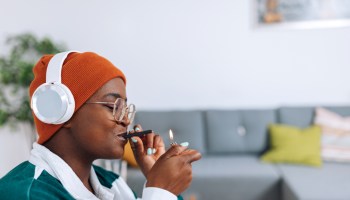What’s better – being depressed and in a relationship, or being depressed, on meds, and single? It’s a tough call. However, a recent study is suggesting that being on antidepressants actually lowers a person’s chances of finding the right partner, so maybe they’re not as effective as “happy pills” as we thought. How… depressing.
[From Wired]
Antidepressant drugs, already known to cause sexual side effects, may also suppress the basic human emotions of love and romance.
That SSRIs, or selective serotonin reuptake inhibitors – the most common type of antidepressant – cause sexual dysfunction is common knowledge. Of the 31 million adults in the United States who take the SSRIs, about 30 percent are believed to experience sexual dysfunction.
But a new theory suggests that SSRI antidepressants may also subtly alter the fundamental chemistry of love and romance, snuffing the first sparks between two people otherwise destined to become lovers, and preventing couples from bonding.
“There’s every reason to think SSRIs blunt your ability to fall and stay in love,” said Helen Fisher, a Rutgers University biological anthropologist who has pioneered the modern science of love.
For some people, of course, sexual side effects are an acceptable price to pay for curing debilitating depression. But as antidepressant use becomes more common, extending beyond full-blown clinical depression to disorders like anxiety and, in some cases, insomnia, the possibility of love-stunting is troubling.
SSRI antidepressants work by boosting circulating levels of serotonin, a mood-regulating neurotransmitter that also inhibits desire. The drugs also decrease dopamine, a neurotransmitter involved in a wide range of cognitive and behavioral processes, among them desire and arousal. The new research suggests that dopamine may also play a part in romance.
During sex, a cocktail of hormones is released that appears to play important roles in fostering romantic attachment within the brain. Take away sex, and romantic love can dwindle. But this is just part of the problem, say Fisher and University of Virginia psychiatrist James Thomson.
Dopamine also appears central to the neurobiology of romantic love and attachment, conditions that Fisher believes to be affected by – but ultimately distinct from – sexual love and its effects. She and Thomson say that SSRIs may do more than cause sexual dysfunction: They also suppress romance.
“There are all sorts of unconscious systems in our brain that we use to negotiate romantic love and romantic attraction,” said Thomson. “If these drugs cause conscious sexual side effects, we’d argue that there are going to be side effects that are not conscious.”
According to Fisher, humans have three distinct but interconnected love-related brain systems: one for sex, another for attachment and another for romantic love. This is still hypothetical – nobody knows exactly what love does in the brain – but Fisher has been a pioneering researcher on romantic love’s neurobiology, and dopamine indeed appears important.
When couples have just fallen in love, the mere sight of the other causes a jump in dopamine-related brain activity. If they manage to stay in love, with the early flush giving way to long-term affection, those brain patterns stay active.
Reduced dopamine levels, however, are an inevitable effect of SSRIs. Reduce dopamine, say Fisher and Thomson, and the possibility of love itself is reduced.
To read the rest of the story, click here.
Maybe antidepressants aren’t for you, but is hormone therapy?





















